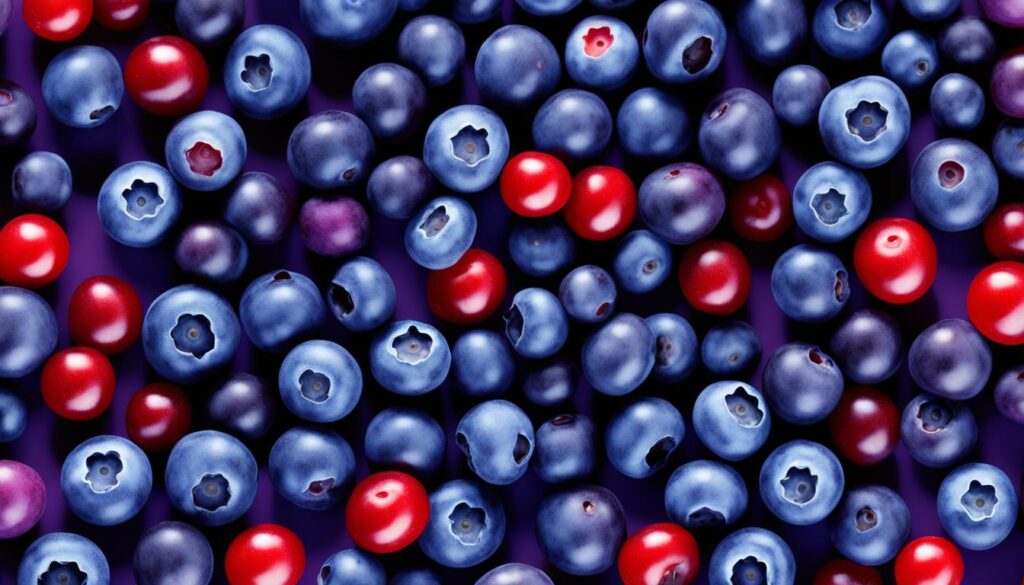Are you looking for a natural way to improve your overall well-being? Look no further than bilberry! Known for its numerous health benefits, bilberry has been used for centuries to support various aspects of your health. From promoting eye health to managing diabetes, bilberry may be the supplement you’ve been searching for.
Bilberry, also known as European blueberry or Vaccinium myrtillus, is rich in antioxidants, particularly anthocyanosides. These powerful compounds can help prevent cell damage and reduce the risk of chronic illnesses like heart disease and cancer. Plus, bilberry is packed with vitamin C, another beneficial antioxidant. While more research is needed specifically on bilberry, studies on similar antioxidants have shown promising results, suggesting that bilberry may have a wide range of health benefits.
If you’re curious about the potential uses and benefits of bilberry, keep reading. In this article, we’ll explore how bilberry can support eye health, assist in diabetes management, help reduce inflammation, promote circulatory health, aid in digestive health, and more. We’ll also discuss the nutritional profile of bilberry and important safety precautions to keep in mind when using bilberry supplements.
Whether you’re looking to protect your vision or boost your overall well-being, bilberry may be the natural solution you’ve been waiting for. Let’s dive into the fascinating world of bilberry and discover how it can enhance your health.
Bilberry for Eye Health and Vision
Bilberry has long been associated with improved vision and eye health. During World War II, British fighter pilots reported improved night vision after consuming bilberry jam. While the evidence is mixed, some studies suggest that the anthocyanosides in bilberry can protect the retina and may be beneficial for conditions like retinopathy, macular degeneration, glaucoma, and cataracts.
One study published in the “Journal of Nutrition” found that consuming bilberries improved visual function in healthy individuals. Another study published in “Investigative Ophthalmology & Visual Science” found that anthocyanoside-enriched bilberry extract improved visual function in patients with early-stage macular degeneration.
While these studies show potential benefits, more research is needed to fully understand the effects of bilberry on vision and eye health. It is always recommended to consult with an ophthalmologist or healthcare professional before starting any supplement or treatment for eye conditions.
“Bilberry has long been associated with improved vision and eye health.”
Potential Benefits of Bilberry for Eye Health
| Condition | Potential Benefits |
|---|---|
| Retinopathy | Anthocyanosides in bilberry may protect the retina. |
| Macular Degeneration | Some studies suggest bilberry may slow the progression of macular degeneration. |
| Glaucoma | Bilberry’s antioxidants may help protect against optic nerve damage. |
| Cataracts | Anthocyanosides may help reduce the risk of cataract formation. |
While the potential benefits of bilberry on eye health are promising, it is important to note that individual results may vary. It is always recommended to consult with a healthcare professional for personalized advice and guidance.
“Some studies suggest that the anthocyanosides in bilberry can protect the retina and may be beneficial for conditions like retinopathy, macular degeneration, glaucoma, and cataracts.”
Next, we will explore the potential benefits of bilberry for managing diabetes.
Bilberry for Diabetes Management
If you have diabetes, you may be interested to know that bilberry can be a helpful addition to your management routine. Traditionally, bilberry leaves have been used to control blood sugar levels in people with diabetes. Studies have shown that bilberry may have a positive impact on managing blood sugar levels, especially when combined with oatmeal.
However, it is important to note that more research is needed to determine the optimal dosage of bilberry for diabetes management. While bilberry shows promise, it is crucial to consult with a healthcare professional for personalized advice on using bilberry as part of your diabetes management plan.
Benefits of Bilberry for Diabetes
Bilberry contains anthocyanosides, which are natural compounds that have antioxidant and anti-inflammatory properties. These properties can potentially help regulate blood sugar levels and improve insulin sensitivity in individuals with diabetes.
Additionally, the high levels of antioxidants in bilberry can help combat oxidative stress, which is a common issue in diabetes. By reducing oxidative stress, bilberry has the potential to protect the cells and tissues of the body from damage.
However, it is essential to note that the effects of bilberry on diabetes management may vary from person to person. It is always best to work closely with your healthcare team to determine the most appropriate and effective treatment plan for your specific condition.

Bilberry Dosage for Diabetes
One of the challenges in utilizing bilberry for diabetes management is determining the correct dosage. While research is ongoing, there is currently no established standard dosage for bilberry supplementation.
Studies have suggested dosages ranging from 20 to 60 grams of dried bilberries or 160 to 480 mg of powdered bilberry extract per day. However, it is crucial to consult with a healthcare professional to receive personalized advice on the appropriate dosage for your specific needs. They will take into account factors such as your overall health, current medications, and individual diabetes management goals.
| Bilberry Form | Dosage Recommendations |
|---|---|
| Fresh Bilberries | Include them as part of a well-balanced diet, consuming regularly |
| Dried Bilberries | 20-60 grams per day |
| Powdered Bilberry Extract | 160-480 mg per day |
| Bilberry Supplements | Follow individual product instructions or consult with a healthcare professional |
Note: It is important to remember that these dosage recommendations are general guidelines, and individual needs may vary. Your healthcare professional will help determine the most suitable dosage for you.
Incorporating bilberry into your diabetes management plan may have potential benefits, but it should not be used as a substitute for prescribed medication or lifestyle modifications. Always work closely with your healthcare team to ensure comprehensive and personalized diabetes care.
Bilberry for Inflammation and Chronic Diseases
Bilberry contains anthocyanosides, which have anti-inflammatory properties. Preliminary studies suggest that these compounds may help lower the risk of chronic diseases, including cancer and Alzheimer’s disease. However, more research is needed to fully understand the effects of bilberry on inflammation and its potential role in managing chronic diseases.
To illustrate the potential benefits of bilberry for inflammation and chronic diseases, consider the following:
- A study published in the Journal of Agricultural and Food Chemistry found that bilberry extract exhibited potent anti-inflammatory effects.
- Research conducted at the University of Eastern Finland demonstrated that bilberry consumption reduced inflammation markers in individuals with metabolic syndrome.
While these findings are promising, it is important to note that more extensive research is required to elucidate the mechanisms of action and the optimal therapeutic applications of bilberry for inflammation and chronic diseases. Nonetheless, incorporating bilberry into a well-balanced diet is an easy and enjoyable way to potentially boost your overall health.

Bilberry for Circulatory Health
Bilberry, with its potential benefits for circulatory health, has been the focus of several studies. It is thought that the powerful antioxidants present in bilberry may contribute to strengthening blood vessels, improving circulation, and preventing the oxidation of LDL cholesterol, a major risk factor for atherosclerosis.
In Europe, bilberry extracts have been traditionally used to treat chronic venous insufficiency, a condition that affects the veins in the legs. Chronic venous insufficiency can cause symptoms like pain, swelling, and fatigue in the affected legs. While some studies have reported improvements in these symptoms with the use of bilberry extracts, further research is needed to validate these claims and determine the optimal dosage and duration of treatment.
When considering the potential of bilberry for atherosclerosis and chronic venous insufficiency, it is important to consult with a healthcare professional for personalized advice and recommendations. They can provide guidance on the appropriate use of bilberry supplements and help determine if they are suitable for your individual health needs and circumstances.
“The use of bilberry extracts for circulatory health and chronic venous insufficiency offers promising possibilities, but more thorough research is necessary to fully understand its effects and establish its effectiveness.”
With ongoing research, bilberry may emerge as a valuable natural approach to promote circulatory health and manage chronic venous insufficiency. However, it is essential to rely on scientific evidence and professional guidance when incorporating bilberry supplements into your routine.
Summary of Bilberry’s Potential Effects on Circulatory Health
| Potential Benefits | Evidence Level |
|---|---|
| Strengthening of blood vessels | Some preliminary studies suggest potential benefits, but further research is needed. |
| Improved circulation | Some preliminary studies suggest potential benefits, but further research is needed. |
| Prevention of LDL cholesterol oxidation | Some preliminary studies suggest potential benefits, but further research is needed. |
| Treatment of chronic venous insufficiency | Some studies suggest improvements in symptoms, but more research is needed to validate the claims. |
Note: The table provides a summary of potential effects of bilberry on circulatory health. It is based on current research and should be interpreted with caution, as further studies are needed to confirm these findings.
Always consult with a healthcare professional before incorporating bilberry or any supplement into your healthcare routine, especially if you have underlying health conditions or are taking medications.

Bilberry for Digestive Health
Bilberry has traditionally been used in European medicine to treat diarrhea. It contains tannins, which have anti-inflammatory and astringent properties that may help reduce intestinal inflammation.
However, there is a lack of studies specifically examining bilberry’s effects on diarrhea. Bilberry’s tannins may also contribute to wound healing, but more research is needed to confirm this benefit.

| Bilberry for Diarrhea | Bilberry for Wound Healing |
|---|---|
|
|
Other Potential Benefits of Bilberry
Preliminary studies suggest that bilberry may have potential benefits for various other disorders, expanding its scope beyond the well-established uses. While more research is needed to fully understand the effects of bilberry on these conditions, initial findings show promising results. Some of the potential benefits of bilberry for other disorders include:
- Ulcers: Bilberry extract has shown potential in supporting the treatment of ulcers, particularly peptic ulcers. Its high antioxidant content may help protect the stomach lining and promote healing.
- Itching: Some studies indicate that bilberry may have anti-inflammatory and anti-itch properties, making it a potential natural remedy for soothing itching caused by various skin conditions.
- Gum Health: Bilberry’s antioxidant and anti-inflammatory properties may also contribute to promoting gum health. It has been suggested that bilberry extracts or supplements could help reduce inflammation and improve oral hygiene.
- Antimicrobial Properties: Bilberry extracts contain compounds that have demonstrated antimicrobial activity against certain bacteria and fungi. These properties suggest potential applications in the development of natural antimicrobial agents, but further research is needed for conclusive results.
It is important to note that although these studies show promising preliminary results, they often involve small-scale experiments and may not have been conducted on humans or include placebo groups. Therefore, more extensive research is necessary to validate these potential benefits and establish the effectiveness of bilberry for these conditions.
To get a better understanding of the potential benefits of bilberry for these specific disorders, it is recommended to consult with a healthcare professional who can provide personalized advice based on your individual needs and medical history.

| Disorder | Potential Benefit |
|---|---|
| Ulcers | Supports treatment and promotes healing |
| Itching | Relieves itchiness caused by various skin conditions |
| Gum Health | Promotes oral health and reduces inflammation |
| Antimicrobial Properties | Exhibits antimicrobial activity against certain bacteria and fungi |
Nutritional Profile of Bilberry
Bilberries are small, deep purple berries that are packed with essential nutrients and beneficial compounds. Here’s a closer look at the nutritional profile of bilberries:
Anthocyanins
Bilberries owe their vibrant color to anthocyanins, powerful antioxidants that offer numerous health benefits. These compounds protect the body against harmful free radicals and help reduce the risk of chronic diseases.
Vitamin C
Alongside anthocyanins, bilberries also contain small amounts of vitamin C, another potent antioxidant. Vitamin C supports immune function, promotes collagen production, and aids in iron absorption.
Quercetin
Quercetin, a flavonoid present in bilberries, possesses anti-inflammatory and antioxidant properties. It may help protect against heart disease, reduce blood pressure, and alleviate allergy symptoms.
Catechin
Catechin is another beneficial compound found in bilberries. It belongs to the class of flavonoids known as catechins, which have been associated with a reduced risk of heart disease and improved cognitive function.
| Nutrient | Amount per 100g |
|---|---|
| Calories | 37 |
| Water | 80g |
| Protein | 0.7g |
| Fat | 0.4g |
| Carbohydrates | 9.8g |
| Dietary Fiber | 2.4g |
| Vitamin C | 16.3mg |
| Potassium | 57mg |
| Calcium | 16mg |
Bilberries are low in calories and primarily composed of water, making them a refreshing and guilt-free fruit. They also provide a good source of dietary fiber, which promotes digestive health and helps maintain a healthy weight.

Safety and Precautions for Bilberry Use
Bilberry fruit and extract are generally considered safe for most people when consumed in appropriate amounts. However, it is important to note that bilberry leaf and extract should not be taken in large quantities over an extended period due to their tannin content, which can cause severe weight loss, muscle spasms, and other adverse effects. Bilberry may also interact with certain medications, such as anticoagulants and diabetes medications, so it is important to consult with a healthcare professional before using bilberry supplements.
Possible Bilberry Side Effects
While bilberry is generally safe for consumption, there are some potential side effects to be aware of. These side effects may include:
- Severe weight loss
- Muscle spasms
It is always recommended to follow the recommended dosage and consult with a healthcare professional before incorporating bilberry supplements into your routine, especially if you have any pre-existing medical conditions or are taking medications.
| Side Effects | Description |
|---|---|
| Severe weight loss | Large quantities of bilberry leaf and extract can lead to unintentional and significant weight loss. |
| Muscle spasms | Excessive consumption of bilberry leaf and extract may cause muscle spasms and discomfort. |
Dosage and Forms of Bilberry
The recommended daily dosage of bilberry supplements varies depending on the individual and the specific product. While there is no established standard dosage, studies have suggested different dosing ranges.
- For dried bilberries, the suggested dosage is typically between 20 and 60 grams per day.
- For powdered bilberry extract, the recommended dosage ranges from 160 to 480 milligrams per day.
However, it is important to note that these dosages are not set in stone and may vary based on factors such as your overall health, specific health condition, and the concentration of active compounds in the supplement. To determine the most appropriate dosage for your needs, it is best to consult with a healthcare professional who can provide personalized recommendations.
Bilberries can be consumed in various forms, depending on your preference and availability. Fresh bilberries are a popular choice and can be enjoyed as a healthy snack or incorporated into desserts, smoothies, or salads. Dried bilberries are convenient for on-the-go consumption, and they can also be used in baking or added to trail mix.
If you prefer the convenience of supplements, bilberry extract capsules or tablets are readily available in the market. These supplements offer a concentrated dose of bilberry’s beneficial compounds and can be easily incorporated into your daily routine.
To highlight the versatility of bilberries, here are a few creative ways to incorporate them into your diet:
- Make bilberry jam or preserves to spread on toast or use as a topping for yogurt.
- Brew bilberry tea by steeping dried bilberries in hot water for a refreshing and antioxidant-rich beverage.
- Add a handful of frozen bilberries to your smoothies for an extra burst of antioxidants and flavor.
- Bake bilberry muffins, pies, or tarts for a delicious and nutritious treat.
Remember, moderation is key when introducing any new supplement or food into your diet. Always follow the recommended dosages and consult with a healthcare professional for personalized advice.

Potential Adverse Effects and Interactions
While bilberry supplements are generally safe when taken in appropriate amounts, it’s important to be aware of potential side effects and interactions. Here are some things to keep in mind:
Possible Side Effects
Using bilberry supplements in excessive amounts or for extended periods may lead to adverse effects. These can include severe weight loss and muscle spasms.
Interactions with Medications
Bilberry can interact with certain medications, including anticoagulants (such as warfarin) and diabetes medications. If you’re taking these medications, it’s crucial to consult with your healthcare provider before using bilberry supplements to avoid any potential interactions.
Cautions for Pregnant and Breastfeeding Women
If you’re pregnant or breastfeeding, it’s advisable to refrain from using bilberry extracts without consulting with a knowledgeable herbal prescriber. They can provide guidance on the safety and appropriateness of bilberry supplementation during this important period.
Remember, it’s always best to seek professional advice before starting any new supplement or treatment, especially if you have specific health concerns or take medications regularly.
Conclusion
In conclusion, incorporating bilberries or bilberry supplements into your diet can provide various health benefits due to their rich antioxidant content. Bilberry has been associated with potential improvements in vision, diabetes management, inflammation, and circulatory health. While more research is needed to fully understand the effects of bilberry and establish optimal dosages, it is a natural and potentially beneficial addition to your overall health and well-being.
However, before starting any new supplement or treatment, it is crucial to consult with a healthcare professional. They can provide personalized advice based on your specific needs and medical history, ensuring that bilberry use is safe and effective for you.
Remember, bilberry supplements should be used as a complement to a well-balanced diet and a healthy lifestyle. They are not intended to replace professional medical advice or medication. By making informed decisions and involving healthcare professionals, you can maximize the potential benefits of bilberry for your health.
FAQ
What are the key uses of bilberry?
Bilberry has been used for centuries for its medicinal properties, including potential benefits for vision, diabetes management, inflammation, and circulatory health.
How does bilberry affect eye health and vision?
While more research is needed, some studies suggest that the antioxidants in bilberry may protect the retina and be beneficial for conditions like retinopathy, macular degeneration, glaucoma, and cataracts.
Can bilberry help with diabetes management?
Traditionally used to control blood sugar levels, bilberry may help manage diabetes, especially when combined with oatmeal. However, personalized advice from a healthcare professional is crucial.
Does bilberry have any effects on inflammation and chronic diseases?
Preliminary studies suggest that the anti-inflammatory properties of bilberry may lower the risk of chronic diseases like cancer and Alzheimer’s, but more research is needed for a comprehensive understanding.
Can bilberry improve circulatory health?
Bilberry may strengthen blood vessels, improve circulation, and potentially prevent the oxidation of LDL cholesterol, which is a risk factor for atherosclerosis and chronic venous insufficiency.
Does bilberry have any benefits for digestive health?
Bilberry has historically been used to treat diarrhea, potentially due to its anti-inflammatory and astringent properties. However, more research is needed to confirm this benefit.
Are there any other potential benefits of bilberry?
Bilberry has shown promise in preliminary studies for treating ulcers, itching, gum health, and as an antimicrobial agent. However, more research is needed to establish these effects.
What is the nutritional profile of bilberry?
Bilberries are low in calories and rich in anthocyanins, vitamin C, quercetin, and catechin. They are primarily water and contain various beneficial compounds similar to huckleberries.
Is bilberry safe to use?
Bilberry fruit and extract are generally safe when consumed in appropriate amounts. However, large quantities of bilberry leaf and extract should be avoided due to potential adverse effects, and it may interact with certain medications. Consult a healthcare professional before use.
What is the recommended dosage and form of bilberry?
The recommended dosages for bilberry supplements vary, but studies suggest ranges from 20 to 60 grams of dried berries or 160 to 480 mg of powdered extract per day. Consult a healthcare professional for personalized dosage recommendations.
What are the potential adverse effects and interactions of bilberry?
Excessive use of bilberry or prolonged use of bilberry leaf and extract can cause adverse effects like severe weight loss and muscle spasms. Bilberry may also interact with certain medications. Pregnant and breastfeeding women should avoid bilberry extracts without professional guidance.
How can bilberry be beneficial for overall well-being?
Bilberry’s rich antioxidant content suggests potential benefits for various health conditions. Incorporating bilberries or bilberry supplements into a balanced diet may contribute to overall health and well-being.

